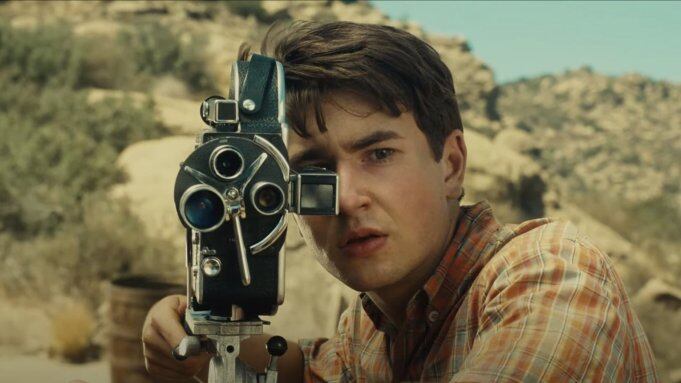Absent fathers, fed-up mothers and obsessive children have always populated Steven Spielberg’s films, sometimes overshadowed by the aliens they befriend.
Now, 33 features into arguably the American directing career of the past half-century, Spielberg finally lays bare these familial roles with his origin story, The Fabelmans. As budding filmmaker Sammy Fabelman comes of age, his cinema fixation grows into a coping mechanism and a magnifying glass for his family’s dysfunction.
There’s no masking autobiography here, even with frequent Spielberg scribe Tony Kushner (Lincoln, West Side Story) co-writing. Sammy’s father, Burt (Paul Dano), is a computer engineer who moves the Fabelmans from New Jersey to Arizona to the Bay Area in pursuit of an IBM career. His mother, Mitzi (Michelle Williams), is a concert pianist turned unhappy homemaker. It’s all true to Spielberg’s life, including three younger sisters, his childhood film projects referenced by name, and his early fear of movies, as seen when Sammy’s parents carefully explain how the pictures work before blowing his mind with The Greatest Show on Earth (1952).
While Spielberg found the memoiristic approach uncomfortable enough to delay making The Fabelmans for two decades, this legacy effort often feels too at ease. Family dinners and Sammy’s 8 mm showcases routinely oversell their simple points about wonder, achievement and betrayal. Similarly, we’re immersed in the family’s jabby sense of humor, but it’s seldom actually funny.
Dano’s and Williams’ performances are thick, actorly and archetypical. Caged at home, Williams does a manic starlet schtick, a bit of Liza Minnelli in her voice; Dano chides in the soft “doggone it, Sammy” meekness of ‘50s sitcoms. Their dreamer/engineer duality defines Sammy’s psychology, but he must also fight its influence.
Burt views filmmaking as mere hobby, while Mitzi presents a cautionary example of artistic ambitions left idle. Her constant desire to perform, though, touches on the film’s strangest, most captivating observation about directing, evidenced in a standout campfire sequence wherein Sammy films his mother dancing and a later scene capturing classmates at the beach: Even as kids, those behind the camera learn early to wield the alluring, transformative power native to their art.
If you want to know what’s really on (and off) Spielberg’s mind, consider a small goof. Mateo Zoryon Francis-DeFord (child Sammy) and Gabriel LaBelle (teenage Sammy) have completely different eye colors—translucent blue and deep amber, respectively.
Sammy’s eyes are his most notable feature: wide, impassioned and persistently illuminated by projector beams. To Spielberg, these eyes are the circuitry of child wonder, not a distinct character attribute.
For much of the movie, Sammy and his portrayers are outshone by avuncular performances from Seth Rogen (as Burt’s best friend) and Judd Hirsch (as the boisterous Uncle Boris). Sammy is essentially a human light bulb, waiting to be illuminated by a blockbuster director who will force this film’s supposed intimacy to come to him, not the other way around.
Indulgences aside, The Fabelmans does largely make good in its third act. When his father moves the family to Northern California, Sammy loses innocence but gains a personality. Kushner and Spielberg start writing intense, venomous, funny school scenes that confront anti-Semitism and reveal an artist developing his edges. In these underdog chapters, LaBelle’s performance comes alive too, especially in the film’s wildest subplot: Sammy dating a comically devout Christian girl (Chloe East).
Has Spielberg earned singular autobiography status? Yes. Can you get most of this (plus clips of better movies) from the 2017 documentary Spielberg? Regrettably, also yes. But there is a late-blooming raison d’être here: reminding us that Spielberg’s great works (from E.T. to A.I. to Munich) have always evoked lonesome alienation when they wanted.
The Fabelmans has tropes of a love letter, but it’s ultimately more a farewell note. When the opportunity presents itself to make movies for real, Sammy—not unlike Close Encounters’ Roy Neary—has a higher calling than his family. That’s curiously unsentimental. Countless directors’ first instinct is to tell us what created them, but it’s taken Spielberg 50 years to share how his inspiration and evacuation occurred together.
Because that’s the life of a film devotee, no? Our families introduce us to movies as a new way of seeing, but we end up loving what we see alone. And if we’re lucky (and good), dreaming it back into existence.
SEE IT: The Fabelmans, rated PG-13, plays at Bridgeport, Cedar Hills, Clackamas, Evergreen Parkway, Fox Tower, and Living Room.

